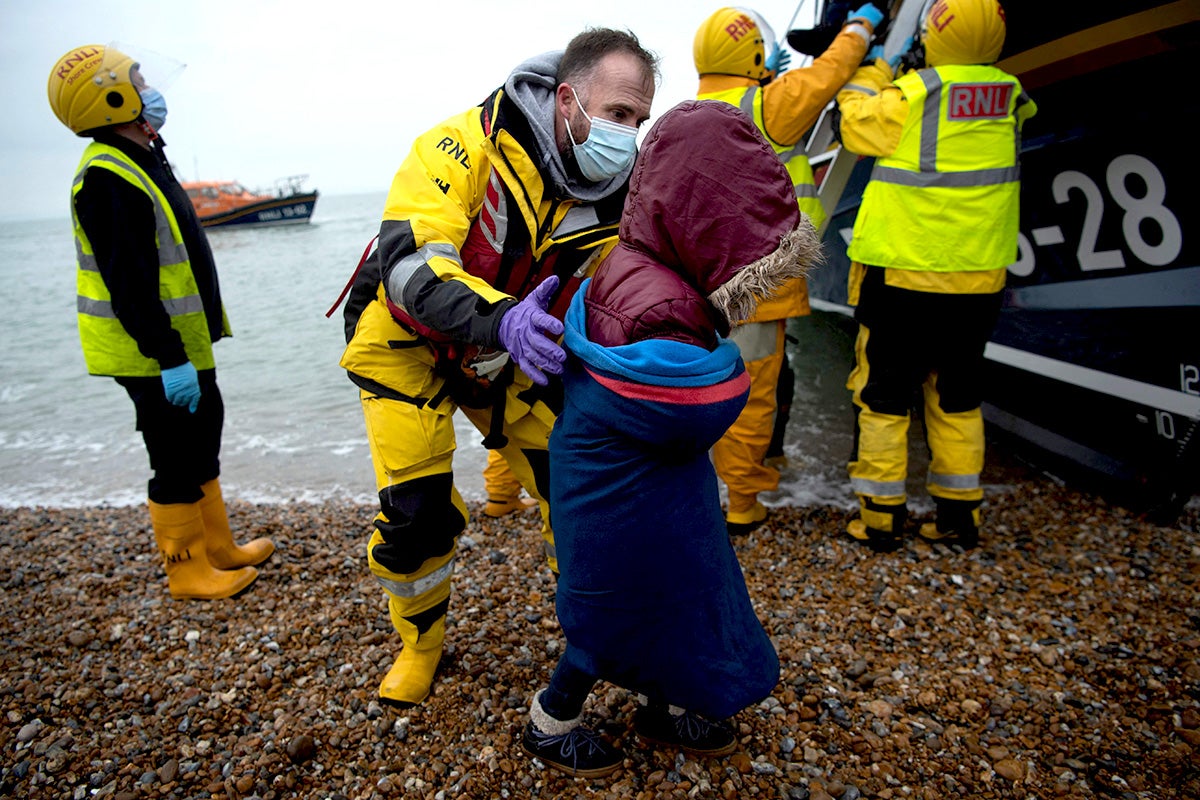Each and every death in the Channel is a human tragedy
Editorial: The people who make these journeys need our help – we are not at war with them

The death by drowning of more than 30 people in the English Channel is as sickening as it was inevitable. Such is the volume of refugees now using this seaborne route, and such is the rush before the weather turns much worse, that an already risky venture undertaken in unseaworthy, overcrowded vessels was bound to grow even more hazardous.
Each and every death is a human tragedy. Too often the cold nomenclature of “economic migrants”, “illegals” and worse serves only to dehumanise these people – men, women and children seeking shelter from danger. The most sobering thought is that these people are so desperate that even this loss of life will not be enough to deter them. They have been fleeing for their lives across continents, and they are evidently prepared to take risks inconceivable to those fortunate enough to live in prosperous, free societies. They are not putting their lives on the line for a spell in a British hotel and £38 a week spending money, as some would have it.
Even if they were all motivated solely by “economic” needs and the desire to secure a better life for themselves and their families, it would still be a heart-rending disaster. The distinction between asylum seekers and economic migrants is, in any case, blurred when people are escaping from areas affected by war. The record shows that the people who make these journeys come from countries where normal life has ceased, and where death, torture and persecution are the norm.
It’s worth reflecting on the role of Britain and the west in destabilising the places these refugees so often come from – Iraq/Kurdistan, Syria, and the lands stretching from northwest Africa to the Middle East that have been preyed on by Isis. Soon, equally inevitably, those left behind and betrayed by the coalition in Afghanistan will be trying to make their way to Britain.
There aren’t easy solutions to any of this. It is not as if nothing has been done for these many years – but plainly not enough has been achieved. The home secretary, Priti Patel, has been rightly condemned for her combination of callousness and incompetence, and she should be examining her conscience as well as her position. She was right, however, to focus on disrupting the people-smugglers, and there have been some successes; but if the full weight of British and European intelligence-gathering had been applied to the gangs, they would surely be less able to go about their lucrative but bloody business.
To keep up to speed with all the latest opinions and comment sign up to our free weekly Voices newsletter by clicking here
Their activities would also be much curtailed if migrants with no proven claim to asylum, after due consideration, were returned to France. That did take place, under the Dublin III Regulation that was governed by the European Union. Brexit not only nullified that central part of migration control; it also antagonised the French to the point of non-cooperation. It is absurd, because if the incentives to cross the Channel in such a dangerous manner were reduced, then the incentives to turn up in Calais and Dunkirk would be as well – something the French devoutly wish for.
Fundamentally, though, it is a matter of “push” rather than “pull” factors. The flow of people from Africa and Asia is as large as it is because of war and violence. People in Syria who would never, a few years ago, have given a thought to leaving their towns and villages, let alone capsizing in a dinghy off the French coast, have been driven by fear. They are getting in the boats because getting into the back of a lorry has become so much more difficult. When conditions in the Channel become impossible, then they will turn to another channel. The people will keep coming – and they know they may die.
The immediate need is to institute an orderly and above all safe channel for asylum seekers, with assessment centres in France and in the UK. Things need to be more structured. We do not need to spend millions on transporting people to Rwanda or Albania, to mention some of the more bizarre notions coming out of Ms Patel’s Home Office. Nor do we need wave machines that will only drown more people, or Border Force vessels pushing them back into French waters or capsizing them.
We also need to reflect on the reality of migration as an engine of economic growth and prosperity. Britain desperately needs people to work on farms, in care homes, in distribution centres, in factories and driving lorries, starting businesses and at all levels of skill – and yet the British state is spending millions on trying to keep them out. It is not an invasion, Britain is not at war with refugees, and there is no need for anyone to lose their life.



Join our commenting forum
Join thought-provoking conversations, follow other Independent readers and see their replies
Comments